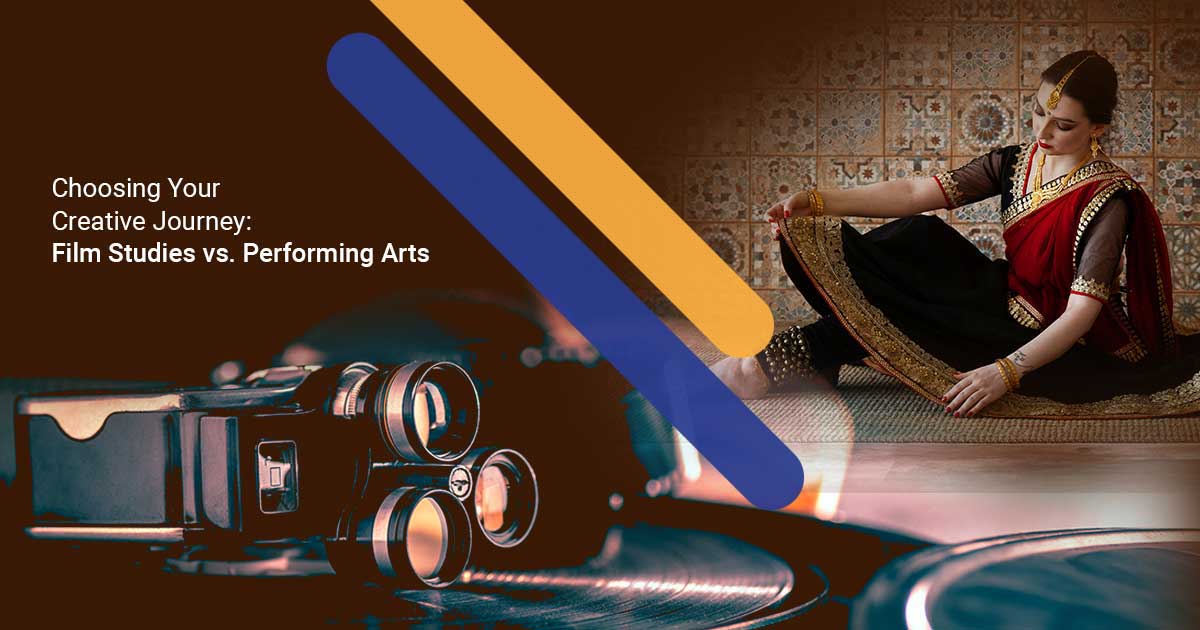Blog Detail


Choosing Your Creative Journey: Film Studies vs. Performing Arts
18-12-2023

In the early years of primary and middle school, music, dance, drama, and various other performing arts curriculum often holds a strong appeal for both students and parents. However, as high school approaches, many students abandon their passions in pursuit of a more mainstream career path. The misconception that studying film or performing arts can only be a hobby persists, leaving numerous talented students feeling adrift in their academic pursuits. Fortunately, the times are changing, and film studies and performing arts are recognised as viable and fulfilling career choices for students. Our blog explores these two creative fields of study and will help you choose the right career pathway!
Film Studies vs. Performing Arts: Key Differences
| Parameters | Film Studies | Performing Arts |
| Focus | Focuses on the analysis and critical examination of film history, theory, and the technical aspects of filmmaking. | Comprises live or staged performances, including theatre, dance, music, and other forms of artistic expression. |
| Medium of Expression | Recorded and edited audio and visual (AV) | Live, unrecorded, real-time performances |
| Courses Offered | UG - Bachelor of Arts (B.A) in Film Studies PG -Master of Arts (M.A) in Film Studies |
UG - Bachelor of Fine Arts (B.F.A) in Theatre, Dance, Music, or others. PG - Master of Fine Arts (B.F.A) in Theatre, Dance, Music, or others. |
| Course Duration | UG Courses - 3 years PG Courses - 2 years |
UG Courses - 4 years PG Courses - 2 years |
| Skills |
|
|
Film Studies vs. Performing Arts: Curriculum
The programmes available in the field of film studies provide a thorough understanding of the cinematic arts. Students study a wide range of cinematic aspects, viz, film history, theory, analysis, and production. The fundamental subjects included in this curriculum are as follows:
- Film History
- Film Theory
- Film Analysis
- Cinematography
- Screenwriting
- Directing
- Editing
- Sound Design
- Visual Effects
- Documentary Film
- Genre Studies
- Independent Filmmaking
- Film Production
On the other hand, courses specialising in performing arts foster a deep understanding of various performing disciplines, such as acting, dance, music, and theatre. These courses cover various subjects designed to nurture students' creative expression, teamwork abilities, and stagecraft. Some of the essential topics included in this curriculum are as follows:
- Acting Techniques
- Voice and Speech
- Movement and Dance
- Music and Instrumentation
- Theatre History
- Script Analysis
- Music Composition
- Choreography
- Musical Theatre
- Theatre Production
- Playwriting
- Dance Styles and Techniques
- Acting for Film and Television
Film Studies vs. Performing Arts: Career Scope
Film studies offers a dynamic career scope in the fields of entertainment and media. After graduating in this field, students can contribute to film production and post-production, set design, sound design, visual effects, and more. Here’s an overview of the career opportunities in the field of film studies:
- Film Director: Film directors are responsible for directing films and overseeing the creative aspects of the production.
- Cinematographer: Cinematographers use camera work and lighting to capture the visual components of a film.
- Screenwriters: Screenwriters develop scripts for various forms of media, including films, television, and digital content.
- Film Editors: Film editors are responsible for editing and assembling footage to produce a seamless and compelling movie.
- Film Critic or Reviewer: Film critics analyse and critique films for publications, websites, or broadcasting.
Conversely, performing arts offers a broad career scope, providing numerous opportunities for students in areas of live entertainment. Students can pursue careers as actors, dancers, musicians, or solo artists. In addition, opportunities in teaching and arts education are also available. Here’s an overview of the career opportunities in the field of performing arts:
- Actor/Actress: Actors and actresses a person who plays the part of a character in a movie or play.
- Professional Dancer: Dancers master various dance styles, from ballet and contemporary to hip-hop and jazz.
- Musician: Musicians can specialise in various instruments, vocals, or composition.
- Choreographer: Choreographers design and create dance routines, sequences, and movements for performances.
- Musical Theatre Performer: Musical theatre performers combine acting, singing, and dancing in stage productions.
In a Nutshell
A growing career potential of film studies and performing arts is reshaping the conventional narrative, thereby offering students a fulfilling and viable career path. Film studies, with its focus on film analysis, and technical aspects, helps students explore careers in film direction, cinematography and screenwriting., Performing arts, spanning acting, music, and others offers lucrative career advancement opportunities in acting, music, choreography, and beyond. Therefore, students must assess their individual interests and aspirations before taking the final call!